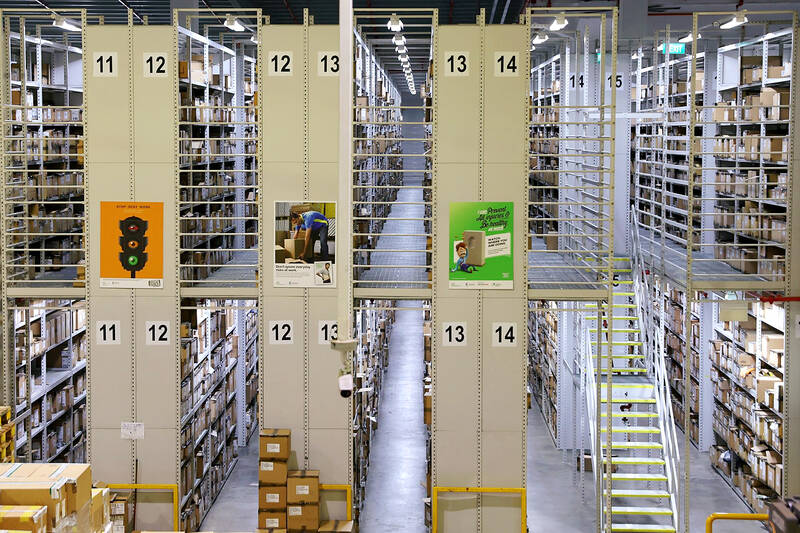A.P. Moller-Maersk A/S, a bellwether for global trade, yesterday said “muted” economic growth is set to push the world’s container shipping volumes down by as much as 2.5 percent this year.
The shipping market has normalized after two years of exceptionally high freight rates, when supply snarls and a shortage of vessels allowed Maersk and its peers to charge higher prices for their services and pocket record profits.
The world is facing “a significant inventory adjustment” after a period where demand has been “absolutely exceptional,” Vincent Clerc, who took over as chief executive officer at the beginning of the year, said in a Bloomberg TV interview.

Photo: Bloomberg
“As the world became a bit more normal after the pandemic, we’ve seen some of these demands slow down,” Clerc said.
The Copenhagen-based container giant said it expects to grow in line with the market, as it unveiled guidance for this year which missed analyst estimates.
Maersk, which handles about one-sixth of all the world’s containers, said that demand in the container shipping industry is set to be in a range of negative 2.5 percent to positive 0.5 percent.
That compares with a November prediction of a “broadly flat to negative” market.
The “overconsumption of goods” is now leading to a “sharp correction” in demand, the Danish company said in a report.
Its key market, China, is struggling and many emerging markets are “vulnerable,” as they enter the slowdown with high debt levels, Maersk added.
Maersk’s underlying earnings before interest and tax could be as little as US$2 billion this year compared with US$31.2 billion last year, the company estimated.
The company also expects to book a restructuring charge of US$450 million on its brands in the first quarter.
“We believe that this guidance reflects the substantially lower container freight rates going into 2023, but also very low visibility in the container market outlook,” Brian Borsting, a credit analyst at Danske Bank A/S, said in a note. “Furthermore, the CEO just took office — hence likely to be slightly conservative on the 2023 outlook in our view.”
Maersk, which boasts the world’s second-biggest container fleet according to Alphaliner, is seeking to become an integrated logistics provider that connects land, sea and air. The company last year embarked on a strategy to expand its air-freight services.
Maersk and MSC Mediterranean Shipping Co last month agreed to discontinue their partnership, which allowed the two companies to share vessels on some of the most lucrative routes worldwide.
Ditlev Blicher, president of Asia-Pacific for the shipping line, told reporters in Singapore on Monday that the tie-up, which is to end in 2025, was not the direction Maersk wanted to go.
While MSC has the world’s biggest fleet, it is still actively adding shipping capacity to remain in the top spot. Maersk, on the other hand, is cutting back, and wants to build a system that would allow it to better control cargo flows.
Containers typically face numerous delays while heading to their destination during black swan events, Blicher said.
However, a better strategy would be to have warehouses scattered across different ports, he said.
That would allow Maersk to consolidate shipments originating from different parts of Asia at a convenient hub, giving more flexibility to send them to where demand is the greatest.

The Eurovision Song Contest has seen a surge in punter interest at the bookmakers, becoming a major betting event, experts said ahead of last night’s giant glamfest in Basel. “Eurovision has quietly become one of the biggest betting events of the year,” said Tomi Huttunen, senior manager of the Online Computer Finland (OCS) betting and casino platform. Betting sites have long been used to gauge which way voters might be leaning ahead of the world’s biggest televised live music event. However, bookmakers highlight a huge increase in engagement in recent years — and this year in particular. “We’ve already passed 2023’s total activity and

Nvidia Corp CEO Jensen Huang (黃仁勳) today announced that his company has selected "Beitou Shilin" in Taipei for its new Taiwan office, called Nvidia Constellation, putting an end to months of speculation. Industry sources have said that the tech giant has been eyeing the Beitou Shilin Science Park as the site of its new overseas headquarters, and speculated that the new headquarters would be built on two plots of land designated as "T17" and "T18," which span 3.89 hectares in the park. "I think it's time for us to reveal one of the largest products we've ever built," Huang said near the

China yesterday announced anti-dumping duties as high as 74.9 percent on imports of polyoxymethylene (POM) copolymers, a type of engineering plastic, from Taiwan, the US, the EU and Japan. The Chinese Ministry of Commerce’s findings conclude a probe launched in May last year, shortly after the US sharply increased tariffs on Chinese electric vehicles, computer chips and other imports. POM copolymers can partially replace metals such as copper and zinc, and have various applications, including in auto parts, electronics and medical equipment, the Chinese ministry has said. In January, it said initial investigations had determined that dumping was taking place, and implemented preliminary

Intel Corp yesterday reinforced its determination to strengthen its partnerships with Taiwan’s ecosystem partners including original-electronic-manufacturing (OEM) companies such as Hon Hai Precision Industry Co (鴻海精密) and chipmaker United Microelectronics Corp (UMC, 聯電). “Tonight marks a new beginning. We renew our new partnership with Taiwan ecosystem,” Intel new chief executive officer Tan Lip-bu (陳立武) said at a dinner with representatives from the company’s local partners, celebrating the 40th anniversary of the US chip giant’s presence in Taiwan. Tan took the reins at Intel six weeks ago aiming to reform the chipmaker and revive its past glory. This is the first time Tan